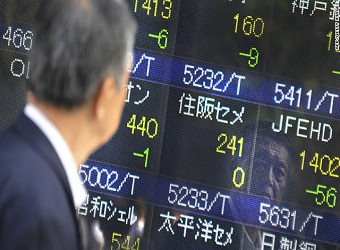Asian stocks rose, with Japan’s Nikkei 225 Stock Average (NKY) closing at the highest level since 2007, as the yen touched a six-month low versus the dollar. Australia’s currency rallied, while European equity-index futures were little changed.
The MSCI Asia Pacific Index advanced 0.7 percent as Euro Stoxx 50 Index (VGA) futures swung between gains and losses at 7:15 a.m. in London. Japan’s Nikkei 225 jumped 1.8 percent. Standard & Poor’s 500 Index futures rose 0.1 percent after the gauge reached an all-time high. The yen traded near a four-year low against the euro while the Aussie climbed 0.5 percent versus the dollar. The pound strengthened for a third day, while Indonesia’s rupiah sank to the lowest since March 2009.
Germany will report unemployment and inflation figures today, while Italy releases a gauge of business confidence and the European Commission publishes its final reading of consumer sentiment. Exporters led gains in Asian stocks after U.S. data yesterday showed jobless claims in the world’s largest economy fell while consumer sentiment exceeded estimates. America’s stock and bond markets are shut for Thanksgiving.
“Asia’s earnings growth does remain largely leveraged to the global economy,” Michael Kurtz, the Hong Kong-based head of global equity strategy at Nomura Holdings Inc., said in an e-mail. “Our economists expect the U.S. economy finally to accelerate to a more robust pace in 2014.”
Nikkei Gains
Germany’s unemployment rate probably held at 6.9 percent for a third month in November while Italian business confidence improved, according to Bloomberg News surveys. Switzerland’s economy expanded 0.5 percent in the third quarter, topping the 0.4 percent median estimate in a Bloomberg survey of 19 economists. Bank of England Governor Mark Carney speaks today.
Japan’s Nikkei 225 rose the most in a week as Honda Motor Co., which gets more than 80 percent of its sales outside Japan, advanced 1.5 percent. The yen was little changed against the dollar, after falling 0.9 percent yesterday and touching the weakest level versus the euro since June 2009. The link between Japanese stocks and the yen is the strongest on record, according to data compiled by Bloomberg.
The S&P 500 (SPX) advanced 0.3 percent to an all-time closing high of 1,807.23 yesterday, while the Dow Jones Industrial Average rose 0.2 percent, also closing at a record.
U.S. Data
Initial claims for unemployment benefits in the U.S. fell by 10,000 to 316,000 in the week ended Nov. 23, the fewest in two months. Economists surveyed by Bloomberg predicted an increase to 330,000. The Thomson Reuters/University of Michigan final index of consumer sentiment rose to 75.1, from 72 in October and above the median estimate of 73.1.
China’s Shanghai Composite Index rose 0.8 percent, led by coal companies, after the government said it will introduce tax cuts and tougher import regulations to help stabilize local operations. The Philippine Stock Exchange Index (PCOMP) climbed 1.7 percent as data showed the economy expanded 7 percent in the third quarter.
Australia’s S&P/ASX 200 Index (AS51) was little changed, paring earlier gains after an 84 percent plunge in Forge Group Ltd. The mining-services company, whose clients include Rio Tinto Group, forecast a loss.
The Aussie snapped its longest losing streak versus the U.S. currency since May. Capital spending increased 3.6 percent from the second quarter, when it rose a downwardly revised 1.6 percent, the Bureau of Statistics said in Sydney today. That compares with the median forecast for a 1.2 percent drop in a Bloomberg News survey.
Rate Changes
“The actual expenditure was a surprise,” said Janu Chan, an economist at St. George Bank Ltd. in Sydney. “It’s suggesting we’re not going to see that sharp decline in mining investment that some had feared.”
Indonesia’s rupiah led declines in emerging-market currencies, weakening beyond 12,000 per dollar on concern capital inflows are slowing. Malaysia’s ringgit forwards dropped for a seventh day, the longest losing streak since July, as the currency slipped 0.2 percent. India’s rupee depreciated 0.3 percent.
Thailand’s baht weakened 0.2 percent. The central bank unexpectedly cut benchmark interest rates yesterday to shore up economic growth amid anti-government demonstrations, while protest leader Suthep Thaugsuban rejected Prime Minister Yingluck Shinawatra’s offer to hold talks. Yingluck survived a no-confidence vote in parliament today.
Brazil’s central bank raised its benchmark interest rate to 10 percent from 9.5 percent yesterday, in line with estimates, as a weaker currency and widening budget deficit spur inflation. The real depreciated for a third day before the decision, dropping 1.5 percent against the dollar.
Platinum rose 0.4 percent, snapping two days of losses. Gold gained 0.2 percent and silver added 0.3 percent.
Source: Bloomberg



